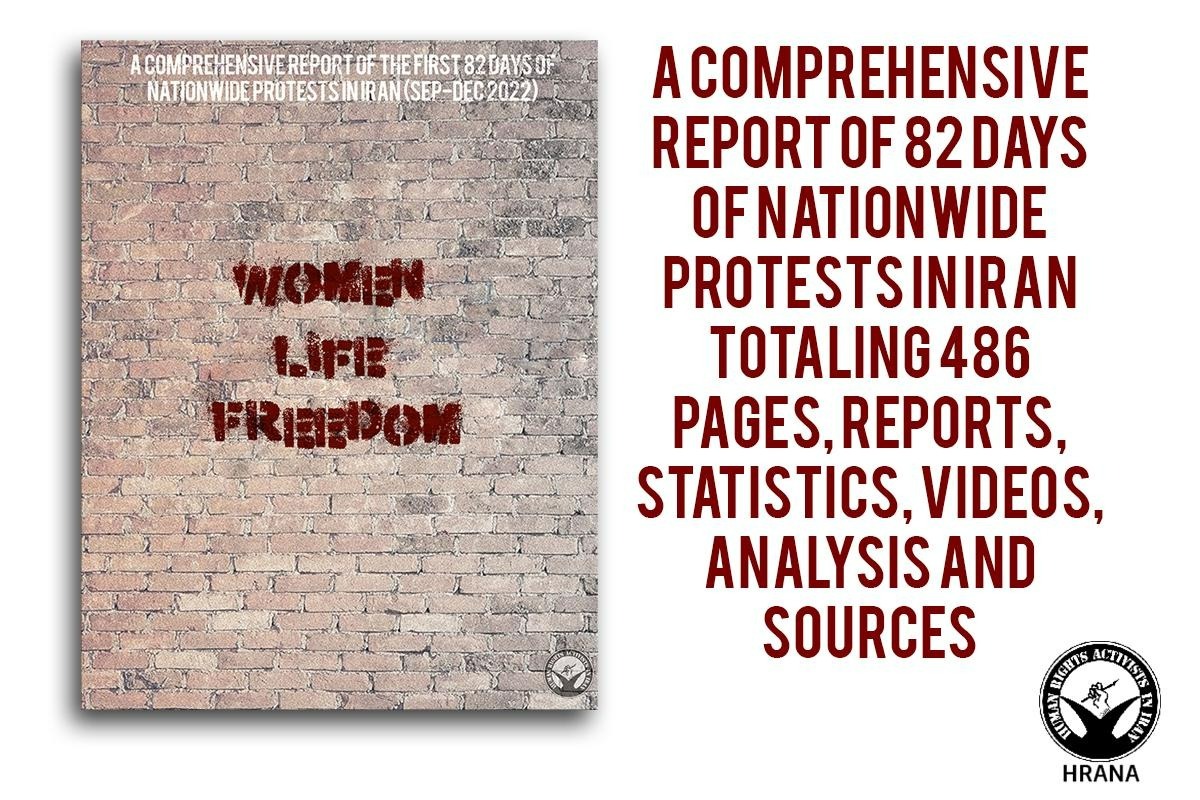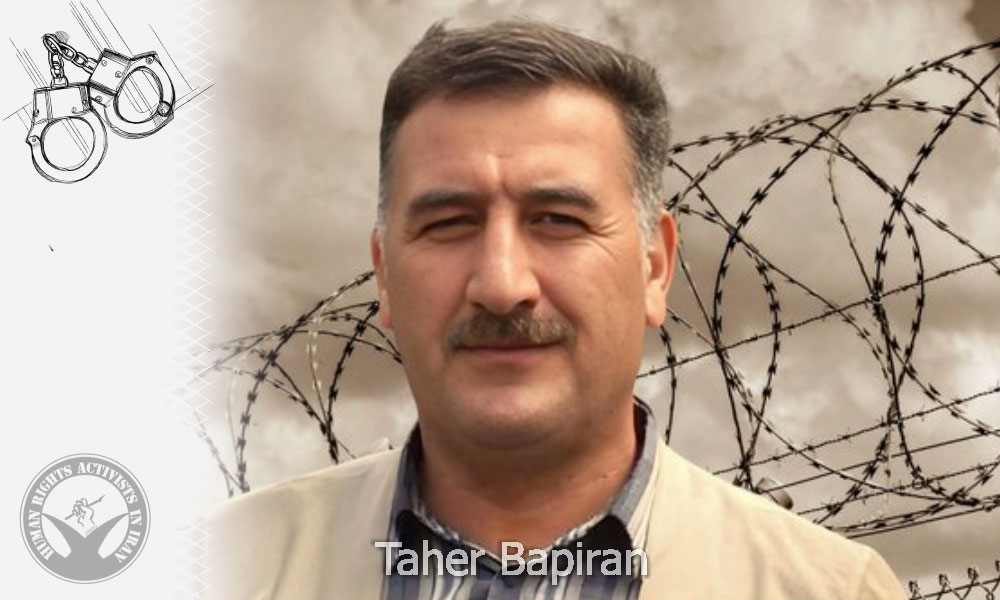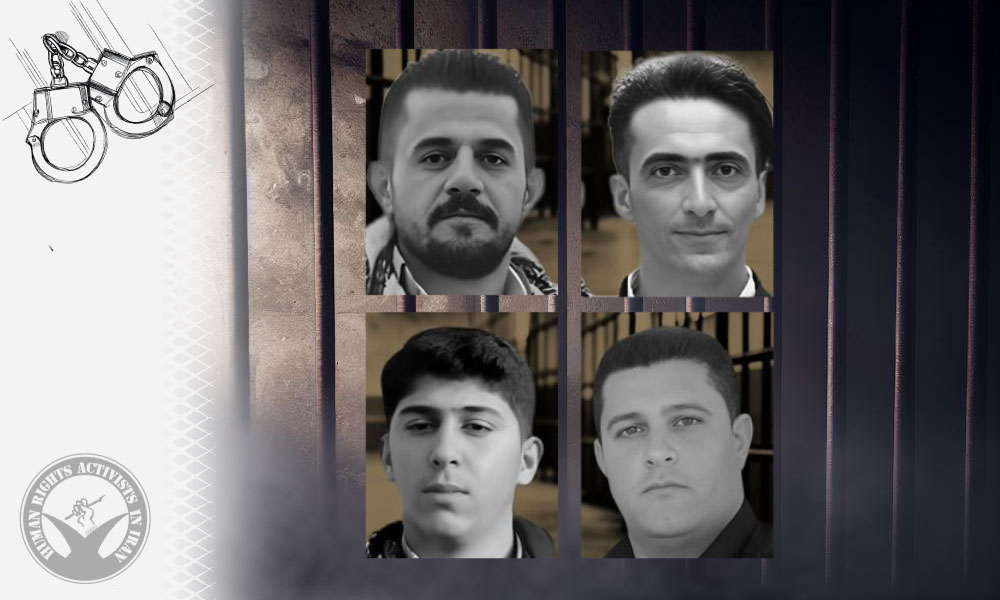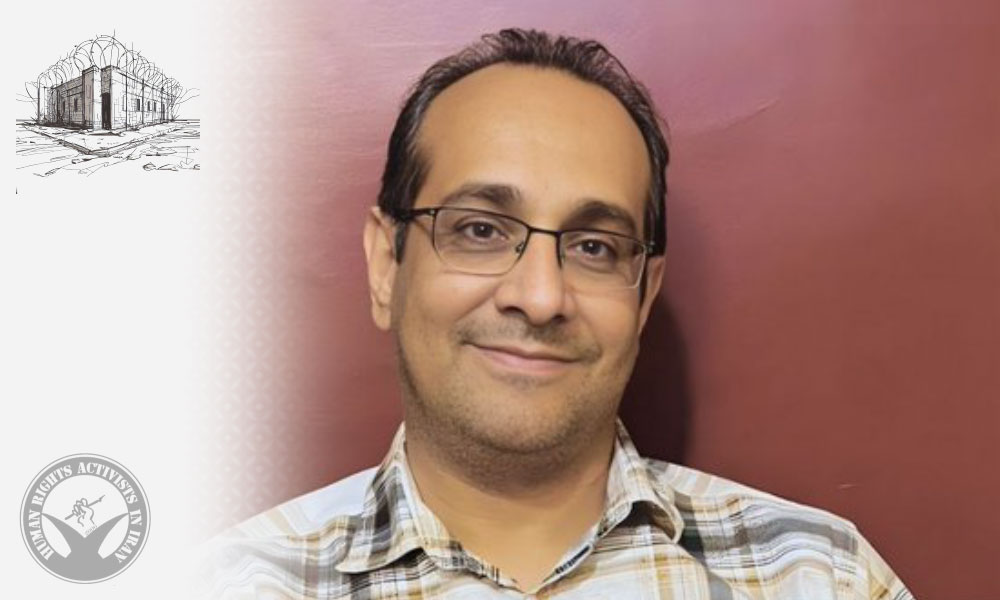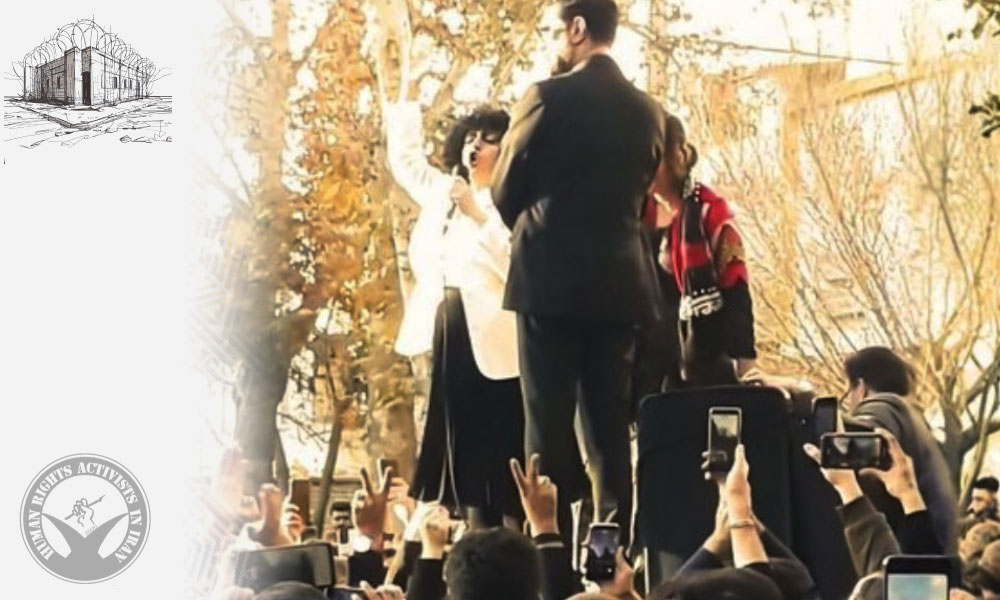Against protests; Public Figures, Government, and Military organizations
On September 17th, Mehdi Ramezani, the deputy governor of Kurdistan, reported that only “a few people who had thrown stones in front of the governorate of this city” were injured and claimed that “no one has been killed” during the protests in Sanandaj and Saqqez over the past two days. Nevertheless, he confirmed the arrest of several protesters.
In the early days of the ongoing protests in Iran, the President of the Islamic Republic of Iran, Ebrahim Raisi, only stated that there is a difference between “protests” and “riots.”
Later, Nasser Kanani, the spokesman of the Ministry of Foreign Affairs of the Islamic Republic, referring to the telephone call of Ebrahim Raisi with the family of Mahsa Amini, said: “We are defenders of women’s rights in the Islamic Republic, and women’s human rights are among our values, and the Islamic Republic is a model and example in the field of women’s rights.”
Ebrahim Raisi, in his more recent messages regarding the recent events, claimed that the protesters “would like to create chaos, have come to the streets and falsely claim that they are grieving for a girl whom just had a young death.”
Similarly, Mohammad Sadegh Kooshki, a fundamentalist political activist, said regarding the protests that “they want to promote chaos, they have come to the streets and falsely claim that they are grieving a girl who died young”.
Also, Mohammad Reza Naqdi, the deputy coordinator of the IRGC, said: “the enemy’s media empire has used the death of a woman as an excuse for their propaganda. Mahsa Amini’s death was accidental.”
Gilan deputy police Chief Hossein Hassanpour, while calling the protesters ‘rioters’, also stated: “If the protests continue in Rasht city; the police will use other legal tactics at their disposal.”
Moreover, Ahmad Khatami, Tehran’s Friday Prayer Imam also said: “Those who have eaten the bread of the system have joined the rioters.”
Hossein Rahimi, the head of the Tehran police, defended the performance of the police force and said: “The police have a duty to warn those who do not comply with the necessary regulations.” In this regard, the Army of the Islamic Republic of Iran issued a statement and stated: “We strongly condemn any destruction of public property, disturbance in the security of the people and the country, and any attack on security personnel.” Also, in a statemeNnt, the Islamic Revolutionary Guard Corps (IRGC) considered the actions of the country’s police command as the guarantor of the authority and security of the system and the Islamic Republic. The General Staff of the Armed Forces of the Islamic Republic of Iran also published a similar statement; “The armed forces will not allow the current security and peace to be compromised.”
Gholam-Hossein Mohseni-Eje’i, the head of the Judiciary, called the protesting citizens “rioters” and asked the prosecutors all over the country to “accelerate” the processing of the cases of the arrested protesters.
Judiciary spokesman Masoud Setayeshi also said: “The confrontation of the judicial system with those who were the main culprits in the recent events in the country will be deterrent and serve as an example.”
Furthermore, Behzad Rahimi, the representative of Saqez and Baneh in the Islamic Consultative Assembly called the arrest of protesters a preventive measure. Ruhollah Salgi, the political security deputy of the governor of Mazandaran, announced that 76 police and Basij agents were injured in this province during the protests.
On the other hand, in response to criticism of the human rights situation in Iran and the suppression of protesters, Nasser Kanani, the spokesman of the Iranian Ministry of Foreign Affairs, claimed: “Human rights perpetrators do not deserve to comment on human rights.” Earlier, Issa Zarepour, the Minister of Communications, and Information Technology, considered the Internet restrictions to be due to security issues. Regarding the WhatsApp and Instagram filter, he highlighted that: “In the current situation and until an unknown time, the filter of some social networks such as WhatsApp and Instagram will continue to be in place.” Jafar Mohammadi, a member of the board of directors of the Nasr Organization in Tehran, also said earlier: “All the start-ups that expressed their condolences on the death of Mahsa Amini in various posts on the social network have been ordered to delete these posts.” In addition, Lotfollah Siahkali, the representative of Qazvin in the Islamic Consultative Assembly, while confirming the internet shut down in Iran, said: “As long as the streets are busy, we will see disruptions and restrictions of the internet and social networks.”
In a report, Tasnim news agency announced that Mehran Modiri was “banned from leaving the country” and claimed: “He has already left the country.”
A Hamshahri newspaper report wrote on behalf of Gholam-Hossein Mohseni-Eje’i, the head of the Judiciary, addressing the artists and celebrities supporting the demands of the protesting people: “Those who echoed enemies’ voice, should know they will have to pay for the material and spiritual damage caused to the people and the country. Those who encouraged and supported [protests] are guilty and their wrongdoings will be dealt with.”
Moreover, in a report, Mehr News Agency announced that there are public accusations and arrest warrants against a number of former IRIB actors and hosts.
Mohsen Mansouri, the governor of Tehran, also threatened the celebrities who supported the protesting people during the nationwide protests and said: “We will deal with the celebrities who fanned the flames of ‘riots’.”
In a visit to the Greater Tehran Prison, Mohammad Jafar Montazeri, the Attorney General of the country, claimed in regard to the detainees of the nationwide protests: “During this visit, it was emphasized to speed up the handling of the affairs of the detainees and the condition of detention of the detainees is favorable.”
Ensiyeh Khazali, the vice president for women’s affairs, stated that the principle of hijab and modesty is cultural building, and claimed: “we do not have a physical confrontation with the issue of hijab, and we hope that hijab will return to its path.”
Also, Kurdistan Governor Ismail Zarei Koosha, while calling the popular protests in Kurdistan ‘riots’, claimed: “in Kurdistan province, less than three percent of the protesters were arrested.”
Hamid Maleki, the deputy director of seminaries (Hozeh), claimed that Mahsa Amini’s death while in custody was a ‘natural death’ and claimed: “they make a ‘natural death’ that occurs all over the world an excuse to hold riots.”
In addition, Hekmat Ali Mozaffari, the head of the Administrative Court of Justice, said in response to the protests against Mahsa Amini’s death: “people should not be deceived by deviant movements, and for this reason, the principles of the regime should not be targeted.”
In a statement, Dezful’s Friday Prayer Imam said that “if his majesty allows us, we will end the riots in an hour” and Iran’s Foreign Minister claimed that “the United States is working with the rioters in the implementation of the ‘insecurity project’ in Iran.”
While standing among the Special Units responsible for supressing the protest in recent days, Hossein Ashtari, the Commander-in-Chief of the Islamic Republic of Iran, called the way to deal with the nationwide uprising of the people “the bright path” and said: “Don’t doubt for a bit, our path is the right path.”
The prosecutor of Tehran also said about the recent incidents: “those who want to disrupt the great achievement of peace and security of the people will face a harsh and decisive action by the judicial system.”
At the same time, the Minister of the Interior asked the judicial system to “deal decisively, quickly and punitively with the leaders of the recent events.” Ali Alghasi-Mehr, Chief Justice of Tehran Province, also said: “Special branches for dealing with crimes against public security have been established in Tehran’s General and Revolutionary Prosecutor’s Office, Revolutionary Court and Court of Appeal.”
The President of the Supreme Court, Mortazavi Moghadam, declared: “The people who committed these atrocities with hot and cold weapons during the recent riots are “real Moharebs [those who wage war against god or people]”. Ali Moalemi, Qaemshahr’s Friday Prayer Imam, also called “burning a scarf extremely indecent.”
Hossein Rajabi, the prosecutor of Qazvin, stated that the judicial system will deal with the people who were active in the gatherings in a decisive, uncompromising and deterrent manner, and said: “The faces that encouraged people in the cyberspace to continue subversive actions are under surveillance and legal action will be taken against them.”
Ahmad Khatami, a member of the Board of Experts, said: “From the beginning, the police said that there was absolutely no beating of Mahsa Amini. What the police did about Mahsa Amini was according to the law and they followed the law, and the story of Mahsa Amini became an excuse for the oppositionists of the regime.”
Later, Hasan Karami, the commander of the special unit of the police, described the anti-government protesters as “rioters” and “thugs” and said that if they come back to the scene, “we are ready to bring the situation under our control within four to five days.”
Moreover, in an interview with Al-Monitor, Hossein Amir-Abdollahian, the foreign minister of the Islamic Republic, made the suppression of popular protests a natural thing and claimed: “We must respond to the riots in a powerful and formidable way, and there is a complete democracy in Iran; Come and see for yourself.”
The Minister of Foreign Affairs of the Islamic Republic of Iran, in an interview with NPR National Radio, said that “Iran is not a place where anyone can stage a color coup or a revolution”, he said: “In Iran, we pay attention to the demands of the people, but with Those who want to riot and be influenced by foreign countries, we will act according to our laws.”
Sadegh Hosseini, the commander of the Kurdistan Revolutionary Guards Corps, also stated that “the regime did all it could for Mahsa Amini’s case” and claimed: “Those who claim to care about Mahsa Amini were happy about the death of this lady.”
More so, Fars News Agency claimed that “most of the protesters are under 18 years of age, they are violent, have no religious campus, they believe in the ultimate freedom of relations with the opposite sex, have weak family ties, they have no economic concerns, and they carry pocketknives and pepper spray.”
On September 26th, Ali Mirahmadi, deputy police chief of Semnan province, announced the arrest of 155 protesters in this province and said: “26 of them were women and 124 were men.” The Ministry of Intelligence of the Islamic Republic of Iran published a statement on Friday, September 30, announcing the arrest of more than 265 protesters during the nationwide protests, including 9 people with citizenship of foreign countries, widespread summonses and opening new cases for some other protesters.
IRIB also published an interview with a person who is said to be the father of Hadis Najafi and claimed: “The police did not kill my daughter. The BBC is lying. And No one can force me to speak against my will.” Prior to this, a video of Hadis Najafi’s mother was published stating that her daughter died by three bullets and after the death of her daughter, her family was under pressure from the security forces, and Hadith Najafi’s sister also published an article on the social media, stating “On the day Hadith’s body was handed over, his father was beaten, and they summon him to the court every day.” It is worth noting that since then, this strategy has become a norm on the IRIB’s regular agenda, and they have published several interviews with other people who are said to be the family members of the killed protesters to be claimed they were not killed by the police.
In addition, a number of news channels that are close to the security institutions have published a video of the forced confessions of a number of citizens who are alleged to be protesters in provinces such as Gilan and Isfahan.
The Attorney General of the country issued a statement to the public and revolutionary prosecutors of the country regarding the handling of the protestors’ case and announced: “The leaders and subordinates of the recent events should be detained until the court is held. In the court, severe punishment, and the issuance of restraining orders without discounts should be requested for them, in the case of detained students, a decision should be made with the opinion of the security guard and the university president, and the students who have played a role in disrupting public security should be temporarily detained; Other students should be released on bail.”
It should be noted that with the announcement of this statement, Ebrahim Hamidi, the Chief Justice of Kerman Province, and Hosseini, the Chief Justice of Kurdistan Province, announced the arrest and imprisonment of some protesters and the issuing and execution of sentences for these people, and Kazem Mousavi, the Chief Justice and The prosecutor of Fars province’s capital also said regarding the arrestees of nationwide protests: “The arrestees of the recent events will be detained until the end of the judicial investigation.”
The Guardian Council announced in a statement: “It expects the judicial system to deal decisively with the main perpetrators and causes of killing and injuring innocent people and security guards, as well as those who attack people and destroy public and private property.”
Furthermore, Mohammad-Bagher Ghalibaf claimed: “Unfortunately, we are busy with those who have not endured even a single slap for the revolution, they have not suffered, and they have not done anything, and they have only cheered while we have emptied the square and pulled away.”
A group of representatives of the Islamic Council issued a statement in response to nationwide protests in Iran, condemning “insulting the sanctity of the people, including women’s Hijab” and claiming: “We are trying to eliminate the grounds for breaking moral norms and obscenity and create an atmosphere to provide suitable culture for the Iranian nation.”
In a statement, the command of Iran’s police force called the protesters ‘rioters’ and ‘enemies of the government’ who “seek to disrupt the order, security and comfort of the nation under any pretext and tactic.” He also announced that “law enforcement officers of the country will stand until the last moment”. In this regard, Ghasem Rezaei, the Deputy Commander of the Police Force of the Islamic Republic of Iran, claimed: “The police force is of the people and for the people, and we will not allow mercenaries and rioters to have a chance.”
More importantly, 233 members of the parliament issued a statement demanding severe punishment for the protesters.
On Thursday, September 29, Mohsen Mansouri, the governor of Tehran, said: “We may not deal with the protesters for any reason in the midst of riots, but anyone who has played a leading role in the recent riots should know that we will definitely deal with them in whatever hole they are hiding in.” In addition, Abedin Khorrami, the governor of East Azerbaijan, claimed: “Today, the war is the war of virtual space and media. A few people, about 150 people, who have entered the field, is the product of years of efforts, propaganda, and psychological operations that the enemy has carried out.”
In addition, Hossein Salami, the Commander-in-Chief of the IRGC, has threatened that “taking revenge for the blood of the martyrs of Zahedan’s Black Friday crime is on our agenda.”
Also, the heads of the three powers of the Islamic Republic have discussed the protests of the last two weeks at the presidential headquarters of Iran. In this meeting, they have appreciated the role of government agencies in ‘combating riots’, and also, the heads of the executive, legislative and judicial branches emphasized “the necessity of recognizing and explaining the conspiracies of anti-Iranians and enemies of the Islamic Revolution from the media and elites.” They also said “they appreciate the honorable people of the country who have thwarted the complex and multi-layered planning of the enemies to create a crisis in the country with their insight, timing and smart demarcation.”
In addition, the IRGC Intelligence Organization published a message and wrote: “Undoubtedly, the children of the proud nation of Islamic Iran will avenge the pure blood of the oppressed martyrs of Zahedan on Dark Friday from the enemies, and the cowardly attacks of the armed opponents will not go unanswered. and by God’s grace, they will wipe out the blind and cruel movements of the enemies.”
Also, Iran Newspaper, in an article entitled “Separatists are busy”, analyzed the direct shooting at the worshipers on Friday in Zahedan and wrote: “Some regions of the country, such as Sistan and Baluchistan region, due to the geopolitical situation and also Special cultural, ethnic, economic and social characteristics have always been exposed to a large amount of terrorist attacks.
On Monday, October 3rd, the Supreme Leader of the Islamic Republic of Iran said at Police University regarding the death of Mahsa Amini and the nationwide protests in Iran: “A young girl died, which broke our hearts, but the reaction to this incident without investigation and without knowing the facts and its truth, Let some people come to make the streets unsafe, burn the Qoran, remove the Hijab from the head of a veiled woman, set fire to the mosque, Hosseiniyeh, and people’s cars, it was not a normal and natural reaction.”
On Tuesday, October 4th, Ebrahim Raisi, while attending the Islamic Council, emphasized Ali Khamenei’s statements the previous day and said: “In his speech, the Supreme Leader of the Islamic Revolution presented a comprehensive analysis of the recent events and the reason for sedition against the country. And they brought up the revolution, which was understandable to everyone, and the reason for the enemy’s anger towards our country and nation is that they see that we are progressing despite the threats and sanctions. He ignores the sanctions and obstacles, yes, but he tries to remove the sanctions, but at the same time, he tries to neutralize the sanctions.”
Mohammad-Bagher Ghalibaf, Speaker of the Parliament, welcomed Ali Khamenei’s statements and said: “Enlightened statements were made in a sensitive situation and he made very wise, intelligent and precise words and once again defined the demarcation between the people and rioters.”
Ahmad Vahidi, the Minister of Interior, stated that today’s enemy’s war is a war of values, and claimed: Those who created slogans such as women, life, freedom; They created the most heinous scenes to defend women and see freedom in women’s nakedness and shamelessness.
On the other hand, Ismail Zarei Kosha, the governor of Kurdistan, in response to the nationwide protests and boycott of classrooms, called for a “decisive approach” to teachers and professors who do not attend classes.
Mahmoud Nabavian (representative of Islamic Consultative Assembly), Farhad Taghvamanesh (IRIB expert), Ayatollah Nasser Makarem Shirazi (Marja), Zohreh Sadat Lajevardi (representative of Islamic Consultative Assembly), Abdollah Hajisadeghi, (Representative of the Supreme Leader in IRGC), Abbas Abdullahi (Head of Islamic Development in Semnan), Ahmad Rastineh (representative of Islamic Consultative Assembly), Ebrahim Fayaz (a fundamentalist professor in Tehran University), Hamid Maleki (Deputy of the Seminaries of the country), Ahmad Hossein Falahi (representative of Islamic Consultative Assembly), Abolfazl Ahmadi (Secretary of the Headquarters for Revival of the Good and Prohibition of Evil in Chaharmahal and Bakhtiari Province), Mohammad Reza Mirtaj al-Dini, (representative of Islamic Consultative Assembly), Mahmoud Mashaikh (Noshahr’s Friday Prayer Imam), Hossein Shariatmadari (Representative of Ali Khamenei in Kayhan newspaper), Morteza Taheri (chairman of the board of directors of Madahan House), Hossein Ghenati (president of Tehran University of Medical Sciences), Ali Shamsipour (spokesman of the Ministry of Science), Hossein Rajabi (prosecutor of Qazvin), Seyyed Ali Khanmohammadi (Spokesman of the Revival of the Good and Prohibition of Evil), Hamid Reza Taraghee (Member of the Central Council of the Islamic Motalefeh Party), Abolfazl Amoui (representative of Islamic Consultative Assembly), Hossein Mirzaei (representative of Islamic Consultative Assembly), Ismail Khatib (intelligence Minister), Ezzatullah Zarghami (Minister of Cultural Heritage, Tourism and Handicrafts), Seyyed Mohammad Nabi Mousavifard (representative of Islamic Consultative Assembly), Jalal Rashidi Kouchi (representative of Islamic Consultative Assembly), Mousa Ghazanfarabadi (representative of Islamic Consultative Assembly), Hossein Rahimi (Chief FARAJA Commander in Greater Tehran), Mohsen Mahdian (CEO of Hamshahri Newspaper), Hossein Jalali (representative of Islamic Consultative Assembly), Alireza Manadi (representative of Islamic Consultative Assembly), Hadi Tahaan (Spokesperson of the Guardian Council), Mohammad Hassan Asfari (representative of Islamic Consultative Assembly), Ali Akbar Raefipour (a fundamentalist political activist), Abbas Moqtadaei (representative of Islamic Consultative Assembly), Mohammad Reza Ahmadi (representative of Islamic Consultative Assembly), Ali Larijani (Advisor to the Supreme Leader of the Islamic Republic of Iran), Ahmadreza Ahmadi (Head of Islamic Development council in Golestan), Akbar Ahmadpour (representative of Islamic Consultative Assembly), Seyed Mojtabi Mirdamadi (Isfahan’s Friday Prayer Imam-temporary), Reza Hajipour (representative of Islamic Consultative Assembly), Hashem Sha’afi (Cultural and Social Deputy of FARAJA in East Azarbaijan), Ismail Kothari (representative of Islamic Consultative Assembly), Hassan Hassanzadeh (commander of the Mohammad Rasoolullah Corps in Greater Tehran- IRGC), Seyyed Kazem Mousavi Ardabili (representative of Islamic Consultative Assembly), Hamed Ameli (Governor of Ardabil province), Hassan Sheikhnejad (Chief FARAJA Commander in Urmia), Seyyed Mojtabi Mahfouzi (representative of Islamic Consultative Assembly), Iqbal Shakeri (representative of Islamic Consultative Assembly), Mohammad Mossadegh Kahnemoui (deputy head of the Judiciary), Mohammad Reza Haddadzadeh (General and Revolutionary Prosecutor of Yazd Province), Mojtabi Zulnoori (representative of Islamic Consultative Assembly), Mohammad Taghi Naqd Ali (representative of Islamic Consultative Assembly), Mehrdad Veis Karami (representative of Islamic Consultative Assembly), Nezamuddin Mousavi (representative of Islamic Consultative Assembly), Javad Karimi Qodousi (representative of Islamic Consultative Assembly), Mohammad Saleh Jokar (representative of Islamic Consultative Assembly), Gholamhossein Karami (representative of Islamic Consultative Assembly), Ali Bahadori Jahormi (Government Spokesman), Seyyed Jalal Hosseini (Political Deputy of the Basij Organization), Ahmad Alirezabeigi (representative of Islamic Consultative Assembly), Hossein Taeb (adviser to the IRGC Commander-in-Chief), Mohammad Nabi Mousavifard (representative of the Supreme Leader in Khuzestan), Saadullah Nasiri Ghidari (President of “Shaheed Beheshti” University), Kazem Gharibabadi (Secretary-General of the High Council for Human Rights of the Islamic Republic of Iran), Mohsen Heydari (representative of Islamic Consultative Assembly), Ahmad Alamolhoda (Mashhad’s Friday Prayer Imam), Mohammad Saeedi (Qom’s Friday Prayer Imam), Mohammad Nabi Mousavifard (Ahvaz’s Friday Prayer Imam), Mohammad Reza Khosravi (Darab’s Friday Prayer Imam), Behrouz Mohebi (representative of Islamic Consultative Assembly), Ali Shaadmani (Deputy Chief Commander of Khatam al-Anbia Centcom for Coordination- IRGC), Ahmadreza Pourkhaaqaan (Head of the Iran’s Judiciary Organization of the Armed Forces), Hossein Maroufi (Deputy of the Basij Organization), Hossein Kasirlou (Prosecutor General of Ardabil Province), Mojtaba Mahfouzi (representative of Islamic Consultative Assembly), Abdolreza Mesri (representative of Islamic Consultative Assembly), Kiumars Heidari (Iranian Army Ground Forces Commander), Mehdi Qoreshi (Urmia’s Friday Prayer Imam), Ali Nematzadeh (Marand’s Friday Prayer Imam) and Alireza Arafi (Director of Seminaries in Iran) are among other officials and political figures close to the government who have reacted against the protesting citizens in relation to the recent events.



